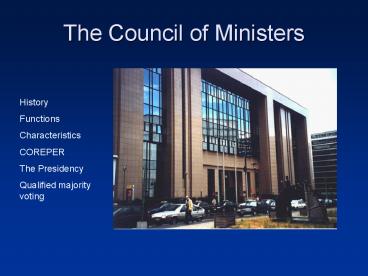The Council of Ministers - PowerPoint PPT Presentation
1 / 27
Title:
The Council of Ministers
Description:
1965-66: the 'empty chair crisis and 'Luxemburg compromise ; ... troika supported by secretariat - Prestigious: advertising the Country on international stage ... – PowerPoint PPT presentation
Number of Views:849
Avg rating:3.0/5.0
Title: The Council of Ministers
1
The Council of Ministers
History Functions Characteristics COREPER The
Presidency Qualified majority voting
2
Introduction
- European Council and Council of Ministers
- Two chamber systems (US Senate, German Federal
Chamber) - A federal chamber?
3
History
- ECSC national control body of supranational High
Authority - 1965-66 the empty chair crisis and Luxemburg
compromise - Single European Act qualified majority voting
(qmv) and co-decision procedure, - Maastricht extension of qmv, unanimity in second
and third pillar - Amsterdam constructive abstention
- Nice flexibility
4
Responsibilities and Powers
- embodiment of the Member States on ministerial
level - According to the matters on the agenda, the
Council meets in different compositions - main decision-making and legislative body
- It concludes, on behalf of the EU, international
agreements with one or more States or
international organisations - It shares budgetary authority with Parliament
5
Council of Ministers hybrid nature
INTERGOVERNMENTAL
- Represents 27 national governments
- Agrees legislation binding on all members
- National Ministers belong to national governments
- Council of Ministers form part of the EU
SUPRANATIONAL
EXECUTIVE
LEGISLATIVE
6
Multiple roles
- The Council through different lenses (Wallace
2002) - Tandem with Commission (where EU has powers)
- Club of governments (new challenges)
- Location of persistent competition for
governments - An arena for networked governance
- A forum for developing policies through
intensive transgovernmentalism where the EU
lacks powers - EU legislature (alongside EP)
7
Council of Ministers Composition
- Consists of national ministers or their
representatives - Many different manifestations (circa 23).
- Most important
- - General Affairs
- - Agriculture
- - ECOFIN
- - EURO
8
(No Transcript)
9
(No Transcript)
10
(No Transcript)
11
Council of Ministers an intergovernmental body?
- Difficulty secrecy and lack of transparency
- Variation in collegiality
- frequency of meetings varies from 15 to 1 per
year. - 85 per cent of decisions not made by ministers
(COREPER, technical committees)
12
Clusters
- lines of conflict
- Net payer/ net receiver (budget, regional and
social funds) - Small and medium/bigger ms (setting norms, power)
- North/south (asylum, social policy, worker
rights) - Socialist/conservative (social rights,
employment) - Old/new ms (idealistic)
- France/Germany/GB/(Italy) (different coalitions)
- IMPORANT Informal meetings, fireplace sittings
13
Committee of Permanent Representatives
COREPER Composition and Function
- Ambassadors of member states to EC
- Prepares agenda and meetings of ministers
- Classified A-points (rubber stamped) and B-points
(discussed)
14
COREPER
- Dual faced
- Executers of national interests BUT High degree
of socialisation - Act collectively against governments
- caught between collectiveness and national
politics (loyalties) - Strong sense of being involved in iterated games
15
Prisoners Dilemma simple, non-iterated game
16
Prisoners Dilemma simple, non-iterated game
A 4gt1gt3gt1 B 2gt1gt3gt4
17
Technical Committees
- Prepare recommendations for COREPER
- Intensive interaction between national and
Commission officials - colleagues judged by competence, not nationality
- Distinction between Commission and national
officials soon lost
18
COREPER and Committees
- autonomy from/through
- technical nature of dossiers
- Ministers too busy to monitor
- instructions loosely drawn
- need to allow room for manoeuvre
- PermReps can influence the national position
19
The Presidency
- rotates between member states every six
months troika supported by secretariat -
Prestigious advertising the Country on
international stage - system has been
criticised (terms too short, scope of demands not
manageable by small members) question of
enlargement
2004 January-June Ireland July-December
Netherlands 2005 January-June Luxembourg July-De
cember UK 2006 January-June Austria July-Decem
ber Finland 2007 January-June Germany July-Dece
mber Portugal 2008 January-June Slovenia July-
December France
20
Qualified Majority Voting
- To overcome the unanimous-vote-dilemma (smallest
common denominator) - To avoid veto-deadlocks
- To challenge Commission action by common accord
- Votes to reflect the different sizes of the
states - Introduction of pass votes and minimal blocking
minorities
21
Qualified Majority Voting - EU 6
22
Qualified majority voting EU 15
368.7
23
Weighted Votes in the Council EU 27
Germany, France, Italy, United Kingdom 29 Spain,
Poland 27 Romania 14 Netherlands 13 Belg
ium, Czech Republic, Greece, Hungary,
Portugal 12 Austria, Sweden, Bulgaria 10 Denmar
k, Ireland, Lithuania, Slovakia,
Finland 7 Cyprus, Estonia, Latvia, Luxembourg,
Slovenia 4 Malta 3 TOTAL 345
24
Nice Triple Majority
- Majority of countries (5014 or 6718) and
votes (74255) and population (62306) - In many cases Simple majority / no voting at all
25
Lisbon Double Majority Voting
- Weighted Voting replaced by
- Majority (55) of council members
- that represent 65 of the unions citizens
- Who wins/loses?
- Postponed until 2017 (at least)
26
The new Council of Ministers
- Due to increasingly applied intergovernmental
method, in the centre of decision-making more
than ever - Council Secretariat has become a collective
institutional actor, which has sometimes more
influence than EP or Commission (Beach 2005) - Questions of QMV and transparency prevail
27
Class Questions
- To what extent has the power of the Commission
been eclipsed by the Council of Ministers in the
decision making process of the EU? - Is that a good or a bad thing?

